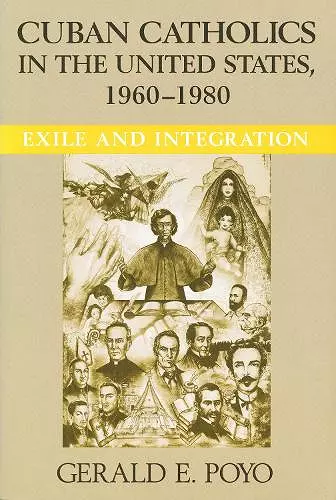Cuban Catholics in the United States, 1960-1980
Exile and Integration
Format:Paperback
Publisher:University of Notre Dame Press
Published:1st Sep '07
Currently unavailable, and unfortunately no date known when it will be back
This paperback is available in another edition too:
- Hardback£100.00(9780268038328)

Everyday life for Cubans in the United States during the 1960s and 1970s involved an intimate interaction between commitment to an exile identity and reluctant integration into a new society. For Catholic Cuban exiles, their faith provided a filter through which they analyzed and understood both their exile and their ethnic identities. Catholicism offered the exiles continuity: a community of faith, a place to gather, a sense of legitimacy as a people. Religion exerted a major influence on the beliefs and actions of Cuban exiles as they integrated into U.S. culture and tried at the same time to make sense of events in their homeland.
Cuban Catholics in the United States, 1960-1980 examines all these facets of the exile and integration process among Catholics, primarily in south Florida, but the voices of others across the United States, Latin America, and Europe also enter the story. The personal papers of exiles, their books and pamphlets, newspaper articles, government archives, and personal interviews provide the historical data for this book. In his thorough examination Gerald E. Poyo provides insights not only for this community but for other faith-based exile communities.
"Gerald E. Poyo's skilled, well researched, and balanced account of the evolution of Cuban-American Catholicism during the 1960s and 1970s concedes at the outset that 'Catholics represent only a small slice of the Cuban exile story.' Yet he convincingly demonstrates their importance in the larger exile narrative, suggesting that the religious traditions of first-generation Cuban-American Catholics offered coherence to a massive exile population shocked with the religious decay and general disruption brought on by postrevolutionary society." —The Americas
"Gerald Poyo, in this important book on Cuban Catholics, follows their exodus to the United States and examines the role religion played in their struggle to survive and to maintain a cultural identity." —The Catholic Historical Review
"Thousands of pages have been written to narrate, interpret, laud, and accuse what has transpired in Cuba in the past fifty years. Gerald E. Poyo's new book brings to readers a magnificent analysis, based on inquisitive and broad research, with a keen sense of the times and problems involved in each period discussed. . . . Poyo's book is enlightening, and written with style, masterful research, and a keen sense of interpretation. In nine chapters and an epilogue, each a comprehensive unit, and each necessary to understand the full text, Poyo develops a magnificent narrative of the presence of the Catholic Church in Cuba since the early nineteenth century." —American Historical Review
"Cuban Catholics in the United States, 1960-1980 is the rare book that delivers more than its title promises. Although it deals principally with Cuban Catholics in South Florida during the decades of the 'historical exile,' the first chapters offer detailed analyses of Catholics' social thought and their growing involvement in Havana's political scene from the 1920s to the 1950s. Subsequent chapters locate exiles in the currents of Hispanic Catholicism in the United States and the transnational routes of the Cuban diaspora." —Journal of American Ethnic History
"Clearly written and well organized, Cuban Catholics in the United States, 1960-1980: Exile and Integration provides an excellent understanding of one aspect of Miami's Cuban community. It is an important contribution to the social history of this most dynamic group." —Journal of Southern History
"Poyo gives a detailed analysis of how Cuban Catholics uneasily yet constructively integrated themselves into American society while resisting the assimilation experienced by other immigrant groups. . . . Cuban Catholics integrated into the Catholic Church in America on their own terms, too. Adapting to an ecclesiastical structure that centered on the local parish. . . . Poyo has written a vitally important book that must be read if one is to gain a complete and accurate understanding about revolutionary Cuba, the Cuban exile community in the United States, or simply study an outstanding example of a committed group of immigrants that maintained cultural identity while succeeding in America." —American Catholic Studies
" . . . a much-needed introduction to one of the most tormented Latino/a groups in the United States, Cuban American exiles. Poyo's historical text is based on careful archival research both on the island and in the United States . . . an extremely well-written overview of Cuban American Catholics, a wonderful narrative of religion, politics, and integration." —The Journal of American History
"This important, impressively researched work focuses on the enormous role Catholicism played during the formative first decades of the Cuban exile community. It is a veritable X-ray of the formation of an influential diaspora community. . . . Highly recommended." —Choice
"Focuses on South Florida in a study of the identity and sometimes reluctant cultural integration of committed, rather than nominal, Roman Catholics in the Cuban exile community." —The Chronicle of Higher Education
"Poyo provides a splendid overview of how Catholic thought shaped Cuban action and reaction to the momentous events of the second half of the twentieth century, in Cuba and in exile. A highly informative account of the complex process of emigration and assimilation at the intersection of politics and religion." —Louis A. Perez, Jr., University of North Carolina at Chapel Hill
ISBN: 9780268038335
Dimensions: 229mm x 152mm x 20mm
Weight: unknown
384 pages